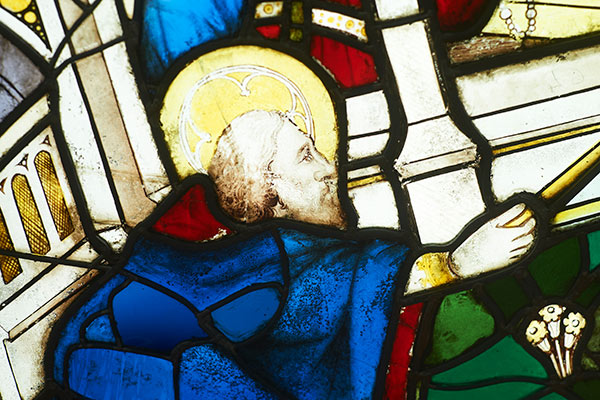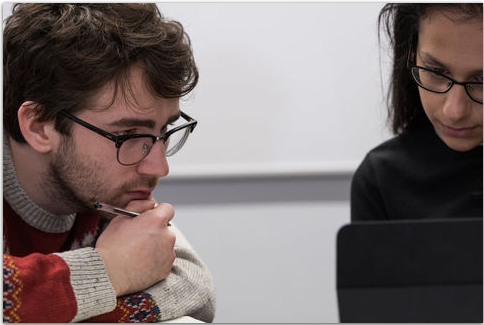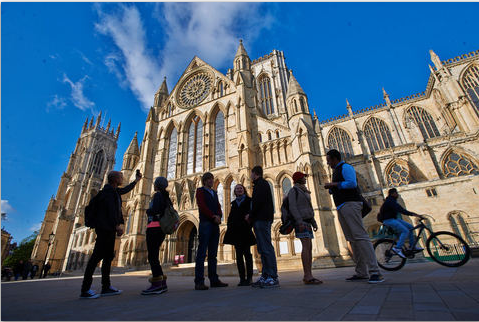
Use philosophy to solve problems in theology
Year of entry: 2024 (September)
Join us online or in person to find out more about postgraduate study at York.
Upcoming eventsaccording to the Times Higher Education's ranking of the latest REF results (2021).
according to the Times Higher Education's ranking of the latest REF results (2021).
Apply the study of philosophy to theology and engage with some of the most complex and historically significant questions that have shaped Western and Middle Eastern civilisation.
Move from studying philosophical and theological problems to investigating them as a researcher in your own right. Focus on Philosophy and the study of Jewish, Christian, and Islamic analytic theology in conversation with each other, informed by analysis of the spiritual practices that these faiths incorporate.
Our department has a strong research profile in analytic theology and we'll provide support for you to pursue your own research project.

The Department is part of our Faculty of Arts and Humanities, ranked 45th in the 2021 Times Higher Education World University Rankings.
You'll engage with research-led enquiry, and focus on contemporary problems and scholarship in philosophy and theology.
You'll cover topics that include thinking about analytic theology as a branch of philosophy and you'll cover Christian, Jewish and Islamic theology. You'll study the analytic theology of the doctrine and spiritual life of Abrahamic faiths.
You'll learn about dissertation preparation, and will work on postgraduate research skills. Later in the year you and your peers will hold an in-house conference.
You'll attend regular research seminars (colloquia) in the department at which guest speakers will discuss their latest research.
Course structure for part-time study
Year 1: Comparative Analytic Theology and two option modules.
Year 2: Research Skills and Dissemination Practice, two option modules and your dissertation.
You will also study four option modules. Option modules vary from year to year according to staff availability. The availability of each option module is subject to a minimum enrolment number. In previous years, options have covered topics such as:
Our modules may change to reflect the latest academic thinking and expertise of our staff, and in line with Department/School academic planning.
Your 10,000 word dissertation enables you to produce a sustained piece of critical writing on a topic of your choosing. It will allow you to apply the core knowledge, skills and experience that you have gained throughout the year.
You'll attend dissertation preparation seminars to enable you to write your proposal, with further support later in the year. You'll be supervised by a member of staff with expertise in a relevant area.
Every course at York is built on a distinctive set of learning outcomes. These will give you a clear understanding of what you will be able to accomplish at the end of the course and help you explain what you can offer employers. Our academics identify the knowledge, skills, and experiences you'll need upon graduation and then design the course to get you there.
| Study mode | UK (home) | International and EU |
|---|---|---|
| Full-time (1 year) | £10,590 | £23,900 |
| Part-time (2 years) This is the year 1 fee. Fees for future years are subject to confirmation. |
£5,295 | £11,950 |
Students on a Student Visa are not currently permitted to study part-time at York.
For courses which are longer than one year, the tuition fees quoted are for the first year of study.
UK (home) or international fees? The level of fee that you will be asked to pay depends on whether you're classed as a UK (home) or international student. Check your fee status.
Find out more information about tuition fees and how to pay them.
Discover your funding options to help with tuition fees and living costs.
We'll confirm more funding opportunities for students joining us in 2024/25 throughout the year.
If you've successfully completed an undergraduate degree at York you could be eligible for a 10% Masters fee discount.
For further information on all eligibility criteria and how to apply for our scholarships see our funding opportunities for Philosophy.
Eligibility: Home, EU or international students pursuing research in the field of philosophy of religion, or research on contemporary issues or themes using a philosophy of religion perspective.
Scholarship award: £5,000 reduction in fees for Home/EU or international students.
A prize of £500 awarded to the MA Philosophy student who achieves the highest essay mark (>72) in the MA assessment period.
A £300 prize awarded to the student who achieves the highest essay mark (>72) in the field of philosophy of religion, or research on contemporary issues or themes using a philosophy of religion perspective.
Eligibility: MA or Research degree. Priority will be given to students studying philosophy of religion.
You can use our living costs guide to help plan your budget. It covers additional costs that are not included in your tuition fee such as expenses for accommodation and study materials.
You’ll work with world‐leading academics who’ll challenge you to think independently and excel in all that you do. Our approach to teaching will provide you with the knowledge, opportunities, and support you need to grow and succeed in a global workplace.
You'll have intensive seminars and individual or small-group tutorials, which will allow you and your tutors to systematically explore complex issues at the forefront of philosophy and theology.
You'll be part of a lively research community at the Humanities Research Centre which includes staff, postgraduate students, postdoctoral scholars and academic visitors from across the arts and humanities.
You will be based in the Department of Philosophy on Campus West. Most of your contact hours will be nearby on Campus West.
Our beautiful green campus offers a student-friendly setting in which to live and study, within easy reach of the action in the city centre. It's easy to get around campus - everything is within walking or pedalling distance, or you can always use the fast and frequent bus service.
Your work will be assessed in a variety of ways:
You will also receive assignments throughout your course which will provide constant feedback on your development, and help prepare you for your assessments.


Our staff have published work in leading journals such as Faith and Philosophy, The Journal of Analytic Theology and Religious Studies.
York hosts the annual workshop for the UK region of the Society of Christian Philosophers, and visiting scholars in philosophy and theology give regular talks and masterclasses.
Studying philosophy and theology develops skills that are highly sought after by employers and transferable to many different careers, such as marketing, education, finance, IT, the charity sector, tourism and leisure industries, as well as into academia.
| Typical offer | |
|---|---|
| Undergraduate degree | 2:1 or equivalent in Philosophy, or joint programme including Philosophy, or Theology where you can demonstrate significant engagement with Philosophy. |
| Other international qualifications | Equivalent qualifications from your country |
You will need to submit examples of written work with your application. Please see our guidance on submitting written work.
If English isn't your first language you may need to provide evidence of your English language ability. We accept the following qualifications:
| Minimum requirement | |
|---|---|
| IELTS (Academic and Indicator) | 7.0, minimum 7.0 in writing and 6.5 in all other components |
| Cambridge CEFR | C1 Advanced: 185, with a minimum of 185 in Writing and no less than 176 in all other components |
| Oxford ELLT | 8, minimum of 8 in writing and no less than 7 in all other components |
| Duolingo | 130, minimum 130 in Production and 120 in all other components |
| LanguageCert SELT | C1 with 33/50 in each component |
| LanguageCert Academic | 75 with a minimum of 75 in Writing and no less than 70 in all other components |
| KITE | 495-526, with 495-526 in writing and 459-494 in all other components |
| Skills for English | C1: Pass overall, with Pass in each component |
| PTE Academic | 67, minimum of 67 in Writing and 61 in all other components |
| TOEFL | 96, minimum 24 in Writing and 23 in all other components |
| Trinity ISE III | Distinction in all components |
For more information see our postgraduate English language requirements.
You may be eligible for one of our pre-sessional English language courses. These courses will provide you with the level of English needed to meet the conditions of your offer.
The length of course you need to take depends on your current English language test scores and how much you need to improve to reach our English language requirements.
After you've accepted your offer to study at York, we'll confirm which pre-sessional course you should apply to via You@York.

We offer a range of campus accommodation to suit you and your budget, from economy to premium.

Explore campus and city life and hear what our current students have to say about living here.

Lively, full of culture and beautiful, York is regularly voted one of the best places to live and visit in the UK.

Find out more about York. Chat to staff and students and take the tour, on campus or online.